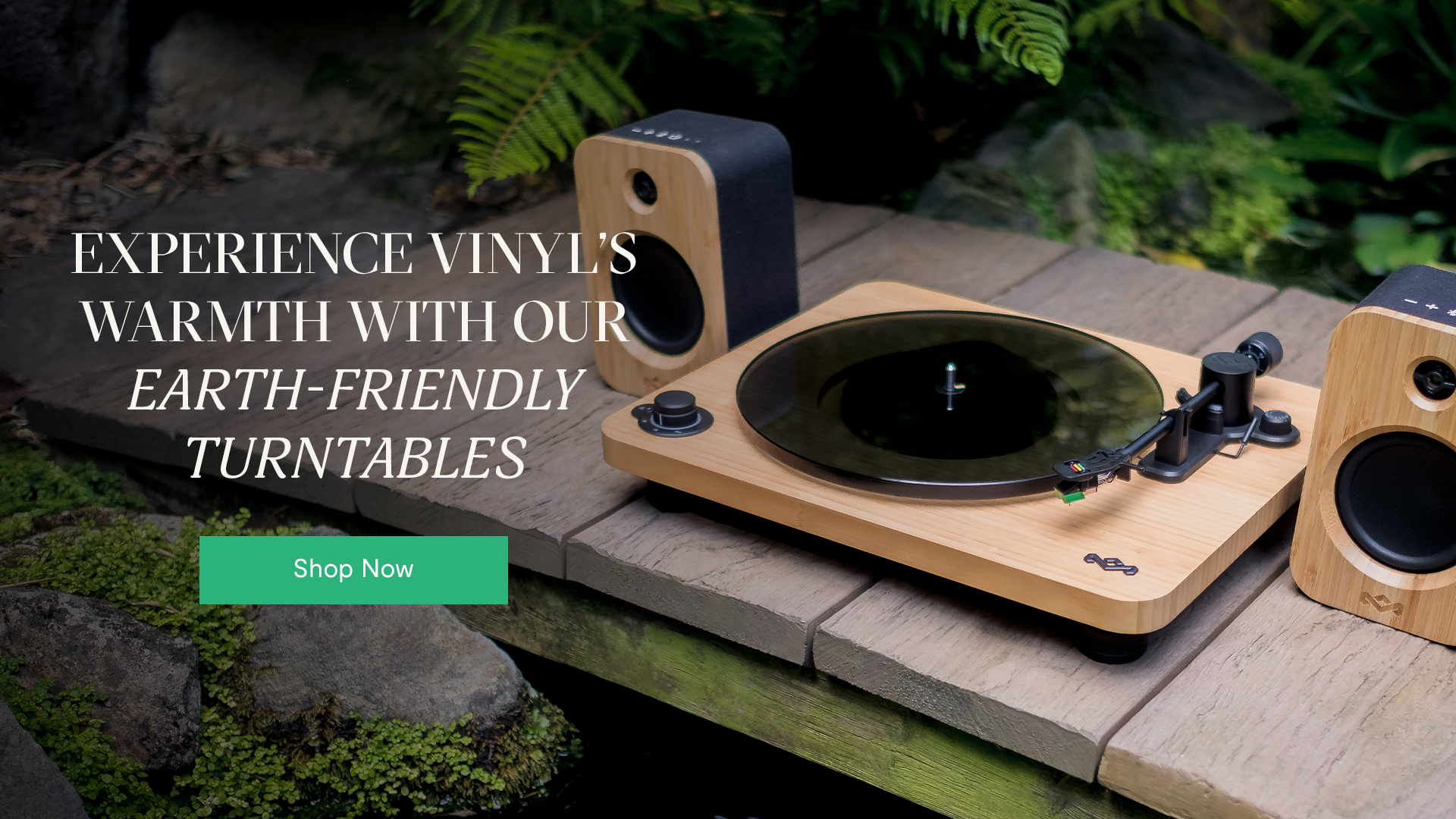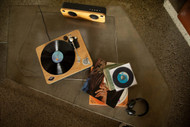The Downsides Of Having A Record Player With Built-In Speakers
Posted by House of Marley on Nov 3rd 2021
When shopping for record players, you've probably noticed that there are a lot of options out there with built-in speakers. For college students and apartment-dwellers who are short on space and budget, this seems like the perfect combo. You get a cute little record player, and it comes with speakers! Hey, that’s one less thing to buy, right?
While we’re not going to tell you that these built-in speakers don’t technically work, they almost completely defeat the purpose of owning a record player at all. In this article, we’ll highlight the downsides of having a recording player with built-in speakers.
Plus, we’ll show you some alternatives that won’t break the bank, cramp your style or take up too much space in the dorm.
Built-in Speakers Sound Bad
The speakers that are built into record players don’t have high-fidelity sound quality. Record players with built-in speakers usually aren’t the highest-quality record players to begin with. They tend to use non-replaceable and non-upgradable plastic materials, like suitcase-style portable record players and have a generally weak build quality.
In other words, since you’re almost always starting with a lower-quality record player, even high-quality speakers wouldn’t make a big difference in sound. But companies that make record players with built-in speakers aren’t putting high-quality speakers into $80 record players—they’re putting in speakers that match the quality of the rest of the unit. That means cheap speakers are going into cheap record players.
But why hasn’t a manufacturer made a high-quality record player with built-in speakers? Keep reading to learn why the mechanics of a record player and built-in speakers don’t mesh.

Speakers Can Make Records Skip
If you’re relatively new to how record players work, there’s a fine amount of balance at play. And we mean that literally. As the record turns on the platter, the needle balances on the record at a set amount of pressure via the counterweight.
If you’ve ever bumped the table a record player was sitting on and heard the record skip, you know that it’s pretty easy to offset this balance. Well, speakers can cause skipping, too. Speakers convert electrical energy into mechanical energy, and the mechanical energy compresses air and converts this motion into sound energy.
All that is to say, speakers move air. And what happens when your record player moves while a record is playing? The record skips. The louder the music, the more air moves, and the more likely you are to have a skipping record.
This can be somewhat addressed by adjusting the counterweight on the record player tonearm. However, that’s not what the counterweight was really made for, and it’s a solution that creates more problems than it solves. Adding too much weight can cause your needles to wear out more quickly and can damage your beloved record collection.
They Can Cause Unwanted Noise Loops
Next time you spin a record, let it play without any amplification and listen really carefully. You can still hear it, can’t you? But why can you hear a vinyl record without amplification when you can’t hear a CD or even a cassette tape?
Briefly put, a vinyl record has tiny little grooves in it that correspond to sound waves, and the needle on your record player “reads” these grooves and vibrates, reproducing those sound waves. That makes vinyl records work more like an electric guitar, which you can still hear when it’s unplugged, than a digital piano.
From the needle or stylus, the mechanical energy is converted into electrical energy, which is later converted back into mechanical energy via the magnet in the speaker—just like we talked about above—so it can play through your speakers.
But where do noise loops come into play? Well, that needle that’s tracing the grooves on your record is very sensitive to vibrations. So sensitive that it can pick up sound from your built-in speakers and send it back through the speakers, creating unwanted noise via feedback loops.
What Should You Get Instead?
Just because there are downsides to having a record player with built-in speakers doesn’t mean there aren’t great, affordable options for you. If you were shopping for a record player with speakers, you were probably interested in the following features:
- Affordable
- Compact
- Portable
Let’s start with affordability. When it comes to record players, you’re going to get what you pay for. The $200-300 price range seems to be the sweet spot for affordability and quality. Anything less and you’re sacrificing build quality. Get into higher prices and you’re getting into luxury record players that are sure to be great devices, but might be a little more than you’re looking for. A record player in that middle range is something that you can grow with rather than feeling like you should upgrade immediately.
As for finding something compact, that’s not too hard to do for modern record players. Record players used to be physically built into furniture, but now they’re mostly sold as standalone units that often aren’t much wider or deeper than a vinyl record. With the exception of a DJ turntable, you shouldn’t have trouble finding a compact record player without built-in speakers.
Portability is where things can get tricky. Our suggestion is choosing a record player with Bluetooth connectivity and pairing it with Bluetooth speakers that you can move with you. A wireless record player, like our Stir it Up Wireless Turntable, is affordable and compact. Pair it with Bluetooth stereo speakers like our Get Together Duo and you have a way to play your favorite records wherever in your house or apartment you’d like—whether that’s the kitchen, living room or bedroom.
Why Do You Buy Vinyl?
Why do you buy vinyl? It’s not a loaded question, we promise! The main reason a lot of us buy vinyl is to have a greater connection to our favorite music. And, frankly, we think music sounds better when we hear it on wax. So why diminish the purpose of listening to vinyl with record players with built-in speakers that don’t sound as good?
Instead, check out our article about how to buy a record player so you can get the most out of your listening experience.













